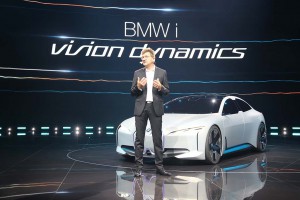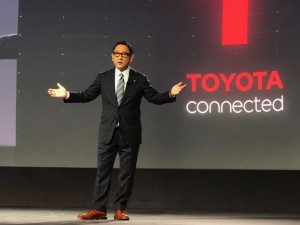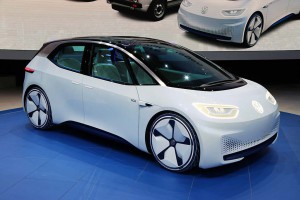The auto industry exodus from major car shows is rapidly accelerating, with Volkswagen the latest to announce plans that will see its flagship VW brand drop out of the upcoming Paris Auto Show, normally Europe’s biggest industry event of the year.
An assortment of major brands, including Volkswagen’s Audi marque, have said they will be no-shows next year at the North American International Auto Show in Detroit, the biggest industry gathering in the U.S. And BMW plans to slash its presence at the 2019 Frankfurt Motor Show, and possibly other auto shows.
“The Volkswagen brand is continually reviewing its participation in international motor shows,” the VW division said on Thursday. It may not completely skip out on Paris, however. While it won’t have a display at the city’s convention center, it may stage concurrent “communications activities,” it added.
That has become an increasingly common pattern over the last couple years. Both General Motors and Mercedes-Benz staged off-site previews ahead of Detroit’s 2018 NAIAS, while holding no formal press conferences during official media days in mid-January.

BMW is planning a major cutback in 2019 in Frankfurt, joining other makers in cutting back on auto show attendance.
(Audi out: Follows growing group of automakers abandoning the Detroit Auto Show. Click Here for more.)
Mercedes has said it will pull out of all activities during or around the Detroit Auto Show next year, as have Audi and BMW. A number of other manufacturers were already no-shows in Detroit this past January, ranging from mainstream Mazda to mid-luxury Volvo and high-line marques Bentley and Aston Martin.
Detroit has a number of peculiar and unique issues that meant few observers were surprised by the once-massive event’s decline. Those include the typically lousy January weather, as well as the fact that buyers in the Motor City remain uniquely loyal to hometown brands.
“I don’t see the reason to be spending money to exhibit at a show where I don’t sell many cars,” a senior executive at a major Asian import told TheDetroitBureau.com, asking to remain anonymous.
(Click Here to see why Detroit’s NAIAS may be moving to October.)

Technology is forcing automakers like Toyota - CEO Akio Toyoda shown here - to shift to non-traditional events like CES.
But some of the problems Detroit has to deal with trouble manufacturers about all auto shows, from Frankfurt to Beijing. At the top of the list is cost. Simply setting up a stand at a major industry event like the Paris Motor Show starts well above $1 million and can push, in some instances, to more than $10 million.
That’s often been the case for German manufacturers at the Frankfurt Motor Show. BMW, for example, not only takes over an entire, stand-alone hall at the city’s convention complex but has even set up a test track on the mezzanine so it can show its products in motion. BMW is expected to reduce its presence in Frankfurt next year from 36,000 square feet to somewhere around 10,000. And it is planning to cut its overall European car show budget by close to 75%, according to a report by the German business publication Handelsblatt.
Organizers for the Paris show told the Reuters news service Thursday that they expect the Volkswagen brand to return in 2020 – Paris and Frankfurt alternating every other year. But the automaker cautioned in its statement that a return only “will be assessed in due course.”
(For more on BMW’s new auto show strategy, Click Here.)
Automakers are expected to further evaluate their commitments to big auto shows over the next few years and the events are considered likely to see further defections. Manufacturers may stage more off-site media events, like those GM and Mercedes held in Detroit, or they could simply drop out entirely. Instead, they are looking for more non-traditional opportunities which range from tech shows, like the Consumer Electronics Show in Las Vegas, to one-brand events targeting journalists and likely customers.

